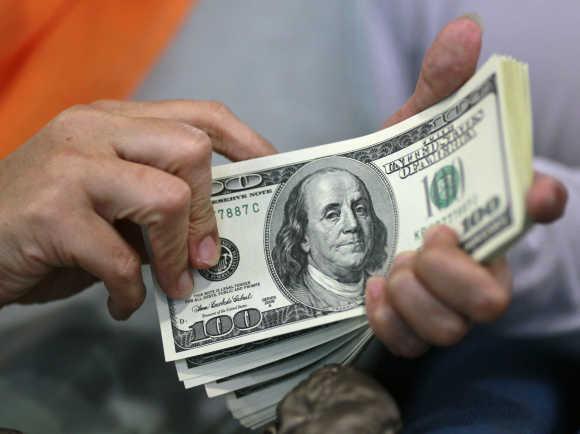Over the last two years, despite an amnesty scheme, only about Rs 2,500 crore of taxes have been recovered, says A V Rajwade.
 Investors in mutual funds in India were recently asked to sign declarations relating to Fatca, the Foreign Account Tax Compliance Act of the US.
Investors in mutual funds in India were recently asked to sign declarations relating to Fatca, the Foreign Account Tax Compliance Act of the US.
This Act is one indication of how tax authorities in most countries are trying to tighten tax collection, from both individuals and companies.
Fatca predates the recent publication of the so-called Panama Papers, which has made tax avoidance/evasion headline news globally.
In India, the first decision of the Narendra Modi government was to appoint a committee to investigate allegations of Indians illegally transferring moneys abroad to avoid taxes.
Over the last two years, despite an amnesty scheme, only about Rs 2,500 crore of taxes have been recovered.
By one estimate that I have seen, developing countries lose tax on around $1 trillion of income, which is being laundered and kept in tax havens each year, the accumulated amount being $20 trillion to $30 trillion!
It is as well to start with a couple of perspectives. At one time, it was thought that "earned income", say salaries, should be taxed lower and "unearned income", like capital gains, taxed higher.
In recent decades, this principle has been overturned, with long-term capital gains attracting far lower taxes than earned income. (I recall Warren Buffet, the great investor, once saying that there was something wrong in a system where his average tax rate was lower than that of his salaried secretary!)
Surely, this is one of the causes underlying the growing income inequalities in most countries.
The second point is that courts have generally made a distinction between tax avoidance and tax evasion.
The former is arranging your financial affairs in such a way as to minimise the tax burden to the extent possible; the latter means not paying taxes through generation of unaccounted money (in India, perhaps the two sectors most responsible for unaccounted money are the real estate business and election expenses).
To be sure, the dividing line between the two is thin and has become a political issue in the US.
One example: corporate tax in the US is levied only on the profits of foreign subsidiaries brought into the US.
No wonder, blue-chip US companies like Apple, Walmart and General Electric are keeping something like $2 trillion abroad.
Another example is the wide variation in corporate tax rates and laws between the US and Europe that allows companies to undertake tax arbitrage between different locations.
For instance, the corporate tax rate in the US is 39 per cent. In contrast, the average tax rate in eight European countries is 25 per cent, and that in Ireland is as low as 12.5 per cent.
This difference has prompted many mergers and acquisitions between US and European companies, their only economic justification being to save on taxes.
The US tax authorities have recently cracked down on such mergers and acquisitions.
There is even talk of a "tax war" between the US and Europe on the issue.
The UK tax regulations have a General Anti-Abuse Rule specifying the kind of tax avoidance arrangements that is considered "abusive": The principle is that any scheme, which has no business or commercial rationale beyond tax avoidance, represents an abuse of the laws and is therefore illegal.
Coming back to the Panama Papers, what has been published are the cases handled by only one law firm in Panama, and that too, not the largest.
The Panama list may only be the tip of the proverbial iceberg: after all, Panama is only one of the "flags of convenience".
Again, law firms are "wholesalers" of trusts and companies, which they keep "in stock": there are small and large retailers like banks, which market them as part of wealth management services to the ultimate beneficiaries.
As we have seen, there are several Indian names in the papers that have been published.
The list seems to include the elite in every field, from politics to business to celebrities to... As the Reserve Bank of India Governor has pointed out, it would be unfair to infer that every name on the list has done some illegal activity. (A lurking suspicion, however, remains: If everything is above board, why go through Panama lawyers to establish companies and trusts in tax havens?
Surely the appearance of chastity is as important as chastity?) There have already been some political repercussions of the publication: The Iceland Prime Minister has been forced to resign; so has Spain's industry minister; and the British Prime Minister was required to publish his tax returns.
The author is chairman, A V Rajwade & Co Pvt Ltd.










